Fiber vs Cable Internet: Making The Right Choice!

Fiber and Cable Internet are the two popular service types that differ significantly in terms of speed, infrastructure, reliability, availability, and associated costs. I’ve used both types of connection for prolonged periods and shall compare them head to head.
I’ll also discuss the pros and cons of each, highlighting their strengths and weaknesses. By the end of this article, you will have a clear understanding of how Fiber and Cable internet differs and which one best suits your needs.
So, let’s get into it!
👉 Related reading: Internet Bandwidth vs Speed: What’s the Difference?
The Key Differences Between Fiber and Cable Internet
- Speed: Fiber internet offers incredibly high speeds of up to 2,000 Mbps, while cable internet provides speeds ranging from 25 Mbps to up to 1200 Mbps.
- Infrastructure: Fiber uses fiber-optic cables for data transmission, ensuring minimal data loss and faster transmission over long distances. Cable internet relies on coaxial cables, which can result in signal loss and potential speed limitations.
- Reliability: Fiber internet offers greater reliability and provides a stable connection even during adverse weather conditions. Cable internet is susceptible to interference from other wireless devices and weather, leading to occasional disruptions.
- Latency: Fiber internet has lower latency, resulting in faster response times for online activities like gaming and video conferencing. Cable internet tends to have higher latency, causing slight delays in data transmission and response times.
- Availability: Fiber connections are often limited to densely populated areas. Cable internet has broader coverage and is more widely available in both urban and suburban areas.
- Cost: Fiber internet generally comes at a higher cost due to the advanced technology and infrastructure. Cable internet is the more affordable of the two.
In case you’re establishing an internet connection for the first time, it’s imperative to learn about each type of internet connection before comparing them.
What is Fiber Internet?
Fiber internet is a super-fast connection that utilizes fiber-optic cables to transmit data as light signals.
This technology allows for incredibly fast and reliable data transmission, providing users with significantly higher throughput and lower latency compared to traditional internet connections.
This makes it ideal for activities that require a lot of bandwidth, such as cloud gaming, 4K/8K streaming, data mining, and downloading large files.
What is Cable Internet?
Cable internet refers to a type of internet connection that uses coaxial cables to transmit data signals.
It delivers internet service through the same cables used for cable television, providing relatively fast speeds and widespread availability in many urban and suburban areas.
Cable internet is a popular option for home internet because it is relatively affordable and widely available.
Fiber vs Cable Internet: Detailed Comparison
The information provided in this comparison is based on extensive research and understanding of industry standards and my personal experience from using both internet services.
1. Functionality: How Do They Work?
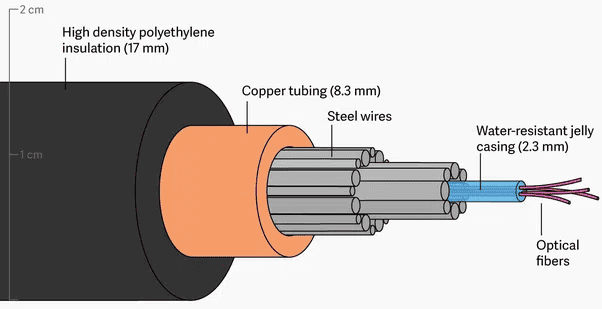
Fiber internet works by transmitting data as light signals through fiber-optic cables, offering high speeds and reliable data transmission.
Electrical signals are converted into light signals using an optical transmitter, and the light travels via thin glass or plastic fibers within the cables.
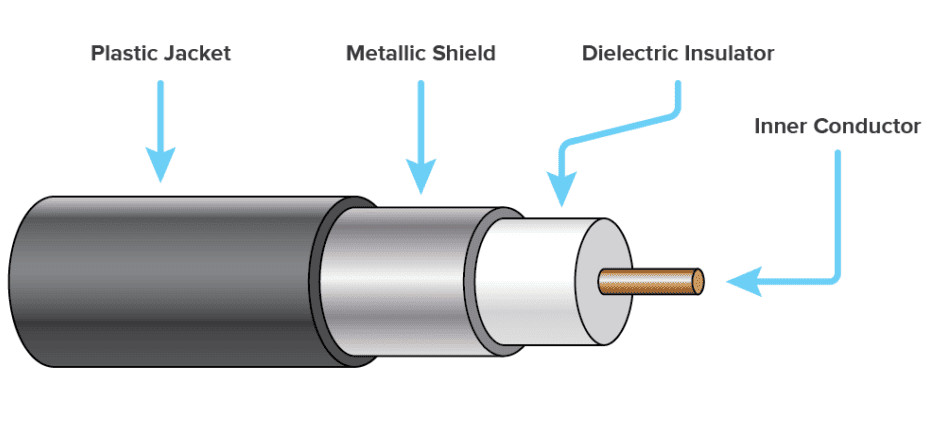
Cable Internet, on the other hand, utilizes coaxial cables to transmit data signals. The ISP sends the internet signal through the coaxial cable to a modem, which converts it into a usable format for devices to access the internet.
Data signals are exchanged between devices and the ISP through the coaxial cable for internet connectivity.
2. Pricing
When comparing the fiber and cable internet in pricing, there is a noticeable difference in the costs associated with similar speed plans.
As you can see in the table above, fiber internet is more expensive than cable internet. This is because fiber is a newer technology and requires more expensive infrastructure to build and maintain.
However, fiber internet is also faster and more reliable than cable internet. Additionally, the limited availability of fiber internet in specific areas creates exclusivity and higher demand, which can drive up prices.
On the other hand, cable internet, with its established presence and broader availability, tends to have more competition, potentially leading to affordable prices.
3. Speeds, Quality, and Reliability
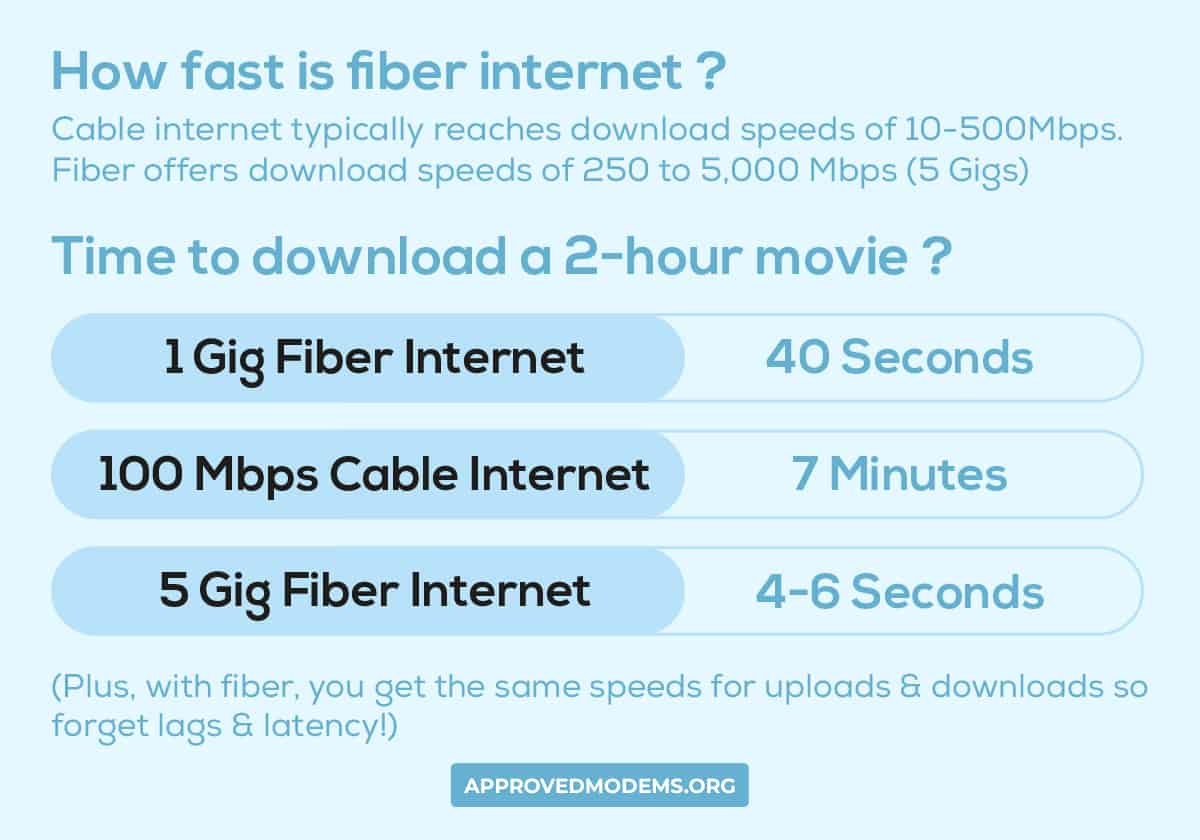
When it comes to speeds and consistency, fiber internet typically offers faster and more reliable performance compared to cable internet.
Fiber internet can deliver simultaneous speeds of up to 2,000 Mbps or even higher, providing a seamless experience for bandwidth-intensive tasks such as streaming, downloading, and online gaming.
In contrast, cable internet speeds can vary depending on factors such as network congestion and the number of users in the area. While cable internet can still provide decent speeds, it may experience occasional slowdowns during peak usage times.
For gaming, fiber internet is generally considered superior due to its faster speeds, lower latency, and greater reliability.
These factors contribute to a more responsive and seamless gaming experience, reducing lag and providing a competitive edge in online gaming.
On the other hand, cable internet also offers a good gaming experience, but you might face lags and high latency during peak hours.
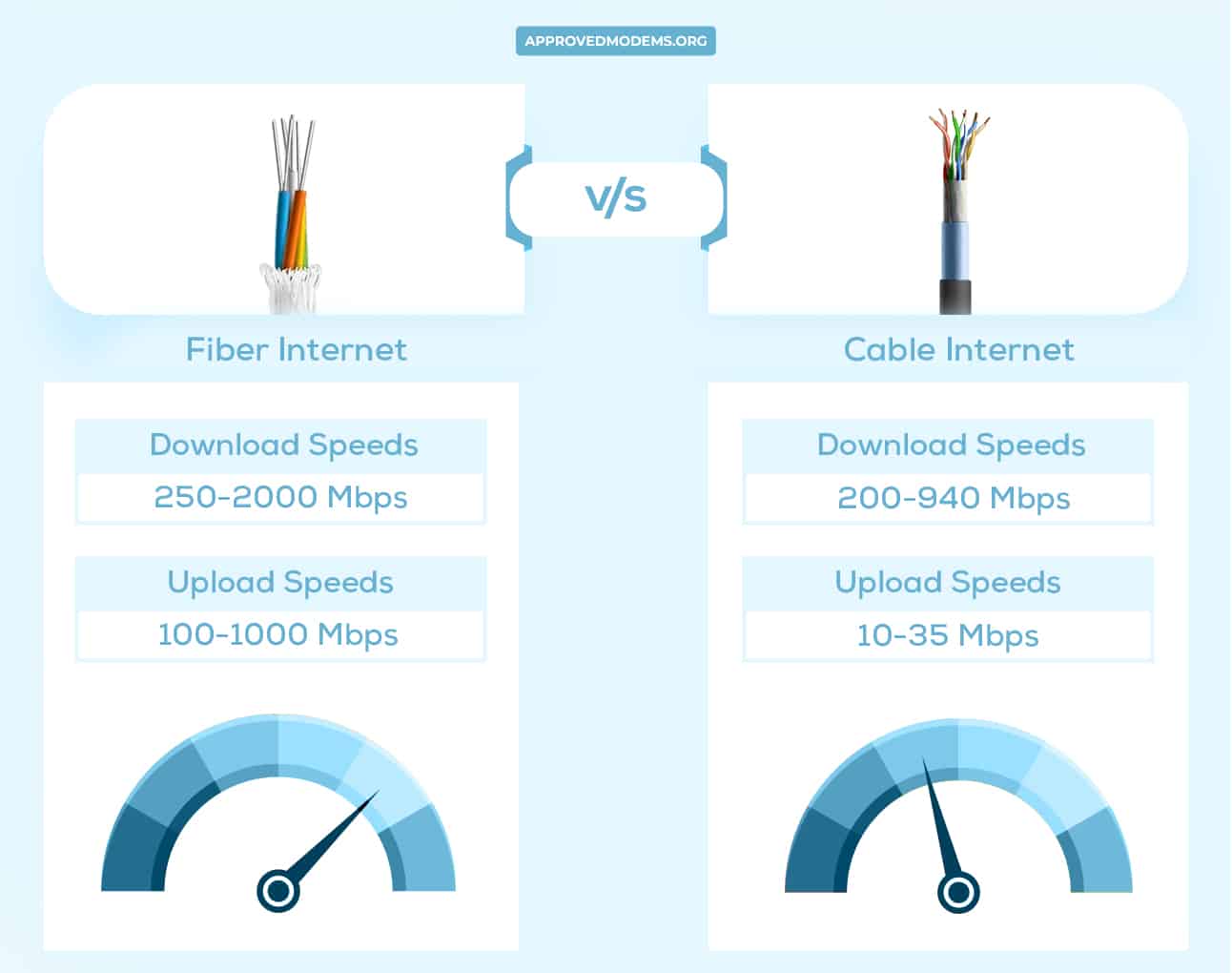
All in all, Fiber internet offers faster speeds, lower latency, and superior reliability, making it the better choice for a top-notch gaming experience. If you are a serious gamer, then you should consider switching to fiber internet.
4. Availability or Coverage
It’s important to note that the availability of fiber internet is typically more limited compared to cable internet.
Fiber infrastructure is still being expanded and may primarily be available in major urban areas or specific neighborhoods. Cable internet, on the other hand, has a broader coverage area and is often available in both urban and suburban locations.
Here are 5-5 quality service providers of both service types:
Fiber Internet:
- Google Fiber
- AT&T Fiber
- Verizon Fios
- Frontier Communications
- CenturyLink
Cable Internet:
- Comcast Xfinity
- Spectrum
- Cox Communications
- Optimum
- Suddenlink
Note: The infrastructure level of each service provider can vary, resulting in varying speeds and performance. That’s why I’ve compared popular ISPs and their offerings in separate articles. You may check them here:
- Google Fiber vs AT&T Fiber
- Google Fiber vs Comcast Xfinity
- Google Fiber vs Charter Spectrum
- Spectrum vs Xfinity (both cable ISPs)
5. Installation & Setup
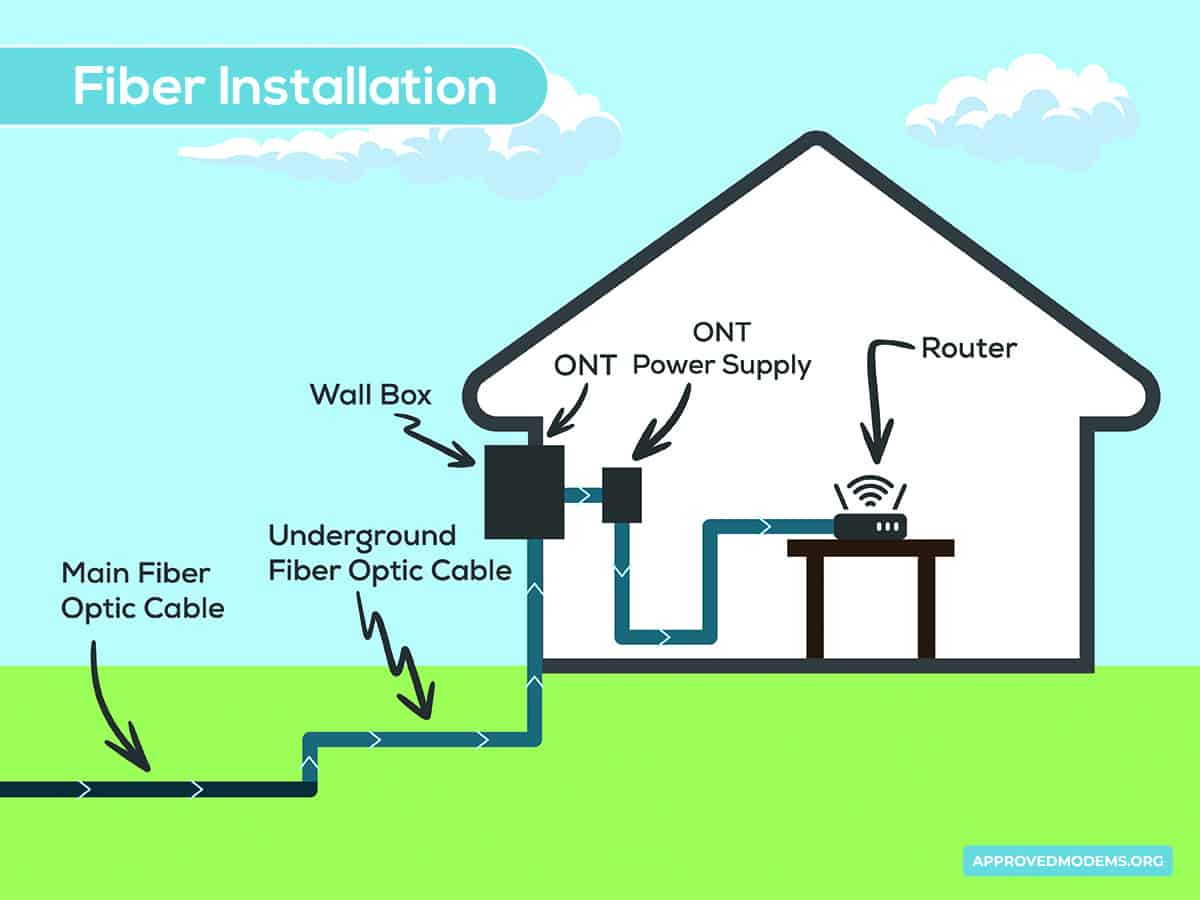
Fiber internet installation requires professional assistance. Trained technicians will visit your place and install the necessary equipment, including the fiber-optic cables and ONT (Optical Network Terminal).
They will ensure proper connectivity and optimize the setup for optimal performance. Self-installation is less common for fiber internet due to the technical expertise and specialized equipment required.
The average cost for professional fiber internet installation can vary depending on the provider and location but is typically in the range of $100 to $300.
Cable internet installation offers more flexibility and often provides the option for self-installation. Service providers generally offer self-install kits, including a modem and instructions, allowing users to set up the connection themselves.
Professional installation is also available for cable internet users who prefer assistance or have complex setup requirements. The average cost for professional cable internet installation can vary but is typically in the range of $50 to $100.
In terms of installation and setup, cable internet has a clear advantage over Fiber internet due to both options. It offers more convenience for users who are familiar with setting up internet connections or prefer a DIY approach.
Advantages and Disadvantages of Fiber Internet
Pros
- Lightning-fast speeds
- Enhanced reliability with minimal signal loss.
- Lower Latency
- Immune to electromagnetic interference
- Less susceptible to weather conditions.
Cons
- Expensive compared to other options.
- Not available everywhere.
- High equipment and maintenance costs.
- Lack of backward compatibility.
Advantages and Disadvantages of Cable Internet
Pros
- Good speeds, ranging from 25 Mbps to 500 Mbps.
- Widespread availability.
- Cost-effective option compared to fiber.
- Compatibility with old devices.
- Lower equipment and maintenance costs.
Cons
- Speeds may vary during peak usage times.
- Susceptible to signal interference.
- Reliability may be affected by weather conditions.
- Higher latency than fiber internet.
TL;DR
- Fiber internet is faster and more reliable than cable internet.
- Fiber internet is more expensive than cable internet.
- Fiber internet is not available everywhere, while cable internet is widely available.
- Fiber internet is the way to go if you need the fastest and most reliable internet connection.
- If you are on a budget or need a widely available internet connection, cable internet may be a better option.
Suggested Read: Cable Internet vs Satellite Internet
Frequently Asked Questions
Is fiber the fastest internet?
Yes, fiber internet is generally considered the fastest mode of internet connection available for residential and commercial use. It can provide incredibly high speeds, often reaching up to 1,000 Mbps or even faster, surpassing the speeds typically offered by other types of internet connections, such as cable.
Is Fiber Internet better than Cable?
Fiber internet generally offers several advantages over cable internet. It provides faster speeds, lower latency, and greater reliability due to its use of fiber-optic cables. Additionally, fiber is not susceptible to electromagnetic interference and is also less likely to be affected by weather conditions. However, the availability of fiber internet may be limited in some areas.
Is fiber internet worth the premium price?
Whether or not fiber internet is worth the premium price depends on your needs. If you need a very fast and reliable internet connection, then fiber internet is the way to go. However, if you are on a budget or don’t need the fastest speeds, then cable internet or DSL may be a better option.
Does fiber internet slow down with more users?
Fiber internet does not slow down with more users. Fiber connections offer dedicated bandwidth, meaning that each user receives their own dedicated connection and is not impacted by the usage of others in the same area. This ensures consistent speeds and performance even during peak usage times.
That’s it for my detailed comparison between fiber and cable internet. I hope this helped you in making an informed decision.
In summary, Fiber internet is the future of high-speed internet. It is faster, more reliable, and more secure than Cable internet. If you want the best possible internet connectivity, fiber internet is the way to go.
Keep reading:
